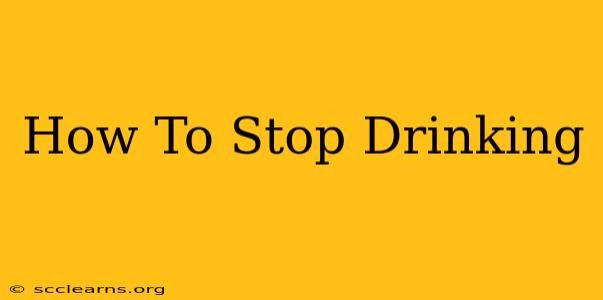Are you ready to stop drinking? Taking that first step is incredibly brave, and this guide will provide you with the information and support you need to navigate this journey successfully. Stopping alcohol consumption, whether you're dealing with mild problematic drinking or alcohol dependence, requires a multifaceted approach. This comprehensive guide will explore various strategies, resources, and support systems available to help you achieve long-term sobriety.
Understanding Your Drinking
Before diving into strategies for quitting, it's crucial to understand your relationship with alcohol. Honest self-assessment is the foundation of successful recovery. Ask yourself:
- How much do you drink? Track your alcohol consumption for a week to get a clear picture.
- How often do you drink? Identify patterns and triggers.
- How does alcohol impact your life? Consider its effects on your physical and mental health, relationships, work, and finances.
- Have you ever tried to cut back or stop drinking before? What worked? What didn't? Learning from past attempts is valuable.
- Do you experience withdrawal symptoms when you try to stop? This could indicate physical dependence and necessitate medical supervision.
Strategies for Quitting Alcohol
There's no one-size-fits-all approach to quitting alcohol. The best strategy depends on your individual circumstances and the severity of your alcohol use. Here are some common methods:
1. Gradual Reduction:
- This approach involves slowly decreasing your alcohol intake over time. This can be a good option for individuals with mild problematic drinking. Set realistic goals and monitor your progress. Consider consulting a doctor or therapist to guide this process.
2. Cold Turkey:
- This method involves abruptly stopping alcohol consumption. It can be challenging and may lead to severe withdrawal symptoms, particularly for those with alcohol dependence. Medical supervision is strongly recommended to manage withdrawal symptoms safely.
3. Medication-Assisted Treatment (MAT):
- MAT involves using medications to manage withdrawal symptoms and reduce cravings. These medications can make the quitting process significantly easier and safer. A doctor can determine if MAT is appropriate for you.
4. Therapy and Counseling:
- Therapy, including cognitive behavioral therapy (CBT) and motivational interviewing, can help you identify triggers, develop coping mechanisms, and address underlying issues contributing to alcohol abuse. Therapy provides a supportive environment for processing emotions and building resilience.
Seeking Support: You Don't Have To Do This Alone
Quitting alcohol is a challenging journey, and seeking support is crucial for success. Here are several resources available:
- Alcoholics Anonymous (AA): AA is a well-established 12-step program that provides peer support and a structured approach to recovery.
- SMART Recovery: SMART Recovery is a science-based self-management program that emphasizes self-empowerment and cognitive techniques.
- Support Groups: Many local communities offer support groups specifically for individuals quitting alcohol.
- Therapists and Counselors: A therapist can provide personalized guidance, address underlying mental health issues, and help you develop coping strategies.
- Medical Professionals: Doctors can assess your physical health, monitor withdrawal symptoms, and prescribe medication if necessary.
Maintaining Sobriety: Long-Term Strategies
Sobriety is an ongoing commitment. To maintain your progress, consider these strategies:
- Develop a strong support network.
- Identify and avoid triggers.
- Practice self-care. Prioritize physical and mental well-being through exercise, healthy eating, mindfulness, and hobbies.
- Engage in healthy coping mechanisms.
- Celebrate your milestones and acknowledge setbacks.
- Consider ongoing therapy or support groups.
Quitting alcohol is a significant achievement. Be patient with yourself, celebrate your successes, and remember that seeking help is a sign of strength, not weakness. Your health and well-being are worth the effort.

